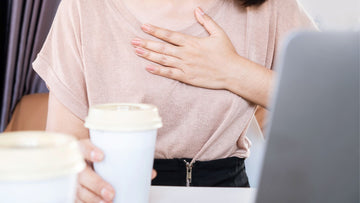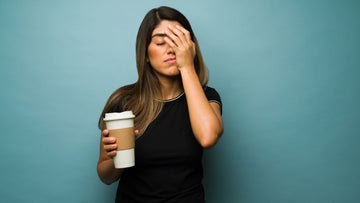What to Expect When You Quit Coffee (Day 1 to Day 30)
sa pamamagitan ng Sila Gatti sa May 16, 2025

For many of us, coffee is more than just a drink—it’s a ritual, a comfort, a morning essential. But what happens when you decide to give it up? Whether it’s for anxiety, hormone balance, gut health, or sleep, quitting coffee can bring surprising changes to your body and mind.
In this article, we’ll walk you through what to expect from Day 1 to Day 30, backed by science and shared experiences. Spoiler: it might be tough at first, but it gets better—a lot better.
Why Quit Coffee?
Caffeine is a central nervous system stimulant that increases alertness and energy, but it also raises cortisol (your stress hormone), can disrupt sleep, affect hormone balance, and irritate the gut in sensitive individuals [1][2].
While moderate coffee intake can have benefits for some, for many women experiencing anxiety, PMS, perimenopause, or digestive issues, caffeine can do more harm than good [3].
Day 1-3: Withdrawal Begins
The first few days can be the hardest. You might experience:
-
Headaches: Caffeine constricts blood vessels; without it, they suddenly expand, causing pain [4].
-
Fatigue: Your body is recalibrating without its daily stimulant.
-
Irritability and mood swings: A drop in dopamine can affect mood temporarily.
-
Cravings: That familiar taste and ritual are hard to let go of.
Tip: Hydrate, rest more if needed, and consider a caffeine-free coffee alternative to keep your routine intact.
Day 4-7: The Fog Lifts (Slowly)
By the end of the first week, many withdrawal symptoms start to subside. You might still feel:
-
Low energy
-
Reduced mental clarity
-
Mood instability
But here’s the good news: your body is already starting to re-regulate its own natural energy systems.
Tip: Focus on nutrient-dense meals, light movement, and early nights. This is a reset period.
Week 2: Natural Energy Returns
Around Day 8 to Day 14, many people notice subtle but encouraging changes:
-
Energy levels become more stable throughout the day
-
Improved digestion: less bloating, reflux, or urgency
-
Better sleep: falling asleep easier, staying asleep longer
You might also notice less anxiety and a calmer nervous system.
Tip: Celebrate the small wins. Keep a journal of how you feel each day—you’ll be surprised how much changes.
Week 3: Hormones & Mood Begin to Stabilise
For women, this is when the hormonal benefits start to kick in:
-
Less PMS or fewer mood swings
-
Fewer sugar cravings (caffeine spikes then drops blood sugar)
-
Improved stress response
Research shows caffeine elevates cortisol, and reducing it allows your HPA axis (the stress-hormone system) to find balance again [5].
Tip: Use this time to create a nourishing morning routine. Swap your coffee with a ritual that still feels grounding (like a warm cup of Not Coffee).
Week 4: A New Normal
By Day 21 to 30, many report the following:
-
Clearer skin
-
Consistent energy all day
-
Deeper, more restful sleep
-
Greater emotional resilience
-
More connected to natural hunger and fullness cues
Your body has adjusted, and you might even forget what the "need" for caffeine felt like.
Tip: Reflect on how far you’ve come. Consider making your new routine a long-term lifestyle change.
Final Thoughts: It’s Not Just About Giving Up Coffee
Quitting coffee isn’t just about removing something—it’s about creating space for better energy, deeper rest, and greater hormonal balance. While the transition can be challenging, the benefits often outweigh the temporary discomfort.
And the best part? You don’t have to give up the ritual. Products like Not Coffee let you keep the comfort, taste, and experience of your morning brew—without the caffeine or the crash.
References:
[1] Lovallo, W. R., et al. (2005). Caffeine stimulation of cortisol secretion across the waking hours. Psychosomatic Medicine.
[2] Lane, J. D., et al. (2005). Caffeine impairs glucose metabolism in people with type 2 diabetes. The American Journal of Clinical Nutrition.
[3] Nie, J., et al. (2012). Caffeine intake and sex hormone concentrations in US women. The American Journal of Clinical Nutrition.
[4] Juliano, L. M., & Griffiths, R. R. (2004). A critical review of caffeine withdrawal: empirical validation of symptoms and signs. Psychopharmacology.
[5] Ginsberg, J. P., et al. (2010). The role of the HPA axis in stress and anxiety. Dialogues in Clinical Neuroscience.





